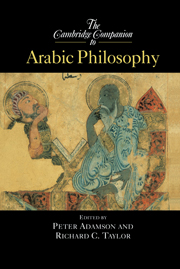Book contents
- Frontmatter
- 1 Introduction
- 2 Greek into Arabic
- 3 Al-Kindī and the reception of Greek philosophy
- 4 Al-Fāarābī and the philosophical curriculum
- 5 The Ismāīlīs
- 6 Avicenna and the Avicennian Tradition
- 7 Al-Ghazālī
- 8 Philosophy in Andalusia
- 9 Averroes
- 10 Suhrawardī and Illuminationism
- 11 Mysticism and philosophy
- 12 Logic
- 13 Ethical and political philosophy
- 14 Natural philosophy
- 15 Psychology
- 16 Metaphysics
- 17 Islamic philosophy and Jewish philosophy
- 18 Arabic into Latin
- 19 Recent trends in Arabic and Persian philosophy
- Select bibliography and further reading
- Index
11 - Mysticism and philosophy
Ibn ‘Arabī and Mullā Sadrā
Published online by Cambridge University Press: 28 May 2006
- Frontmatter
- 1 Introduction
- 2 Greek into Arabic
- 3 Al-Kindī and the reception of Greek philosophy
- 4 Al-Fāarābī and the philosophical curriculum
- 5 The Ismāīlīs
- 6 Avicenna and the Avicennian Tradition
- 7 Al-Ghazālī
- 8 Philosophy in Andalusia
- 9 Averroes
- 10 Suhrawardī and Illuminationism
- 11 Mysticism and philosophy
- 12 Logic
- 13 Ethical and political philosophy
- 14 Natural philosophy
- 15 Psychology
- 16 Metaphysics
- 17 Islamic philosophy and Jewish philosophy
- 18 Arabic into Latin
- 19 Recent trends in Arabic and Persian philosophy
- Select bibliography and further reading
- Index
Summary
In a monotheistic culture of the “examined and contemplative life,” the central intellectual challenge for a thinking, experiencing believer is to address the question: how can I know God? and concomitantly, how can I know what God means? In the classical period, Muslim thinkers approached this question by delineating four possible paths toward realizing, understanding, internalizing, and implementing the “truth” or “reality.” These four ways are succinctly and importantly examined in the famous “autobiography” of the theologian and Sīfī Abū Hāmid al-Ghazālī (d. 1111), al-Munqidh min al-dalāl (The Deliverer from Error): the imitation of infallible authoritative example (ta'līm, following the infallible Shī'ite Imām), acceptance of prophetic traditions and norms (taqlid of the Sunna), rational and discursive argument ('aql, naz. ar), and ineffable “pure” experience or “taste” (dhawq). So the first question that needs to be considered is the method of acquiring truth and certainty. In the context of this chapter, the options that I shall consider are reason and experience. In al-Ghazālī’s account, the use of philosophical reason is denounced for its failure to conform to “revealed truths,” while mystical experience is lauded: the difference is, as he puts it, that reason is an indirect means of acquiring truth through the verification of arguments, while “taste” experiences and directly takes on the state of truth, effecting a critical complementarity between knowledge and action. “Taste” has the added advantage of being a Qur’ānic concept and became the commonplace nomenclature for experience in Sīfī circles. Thus it would seem that early on in Islam, we find reason and experience pitted against each other.
- Type
- Chapter
- Information
- The Cambridge Companion to Arabic Philosophy , pp. 224 - 246Publisher: Cambridge University PressPrint publication year: 2004
- 1
- Cited by



